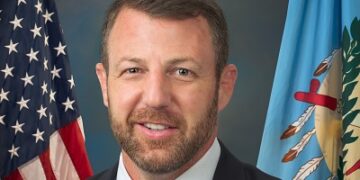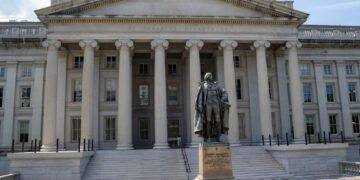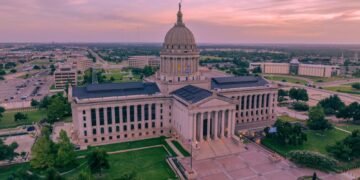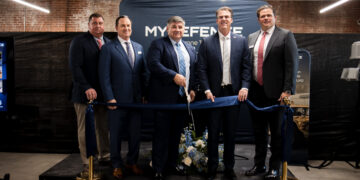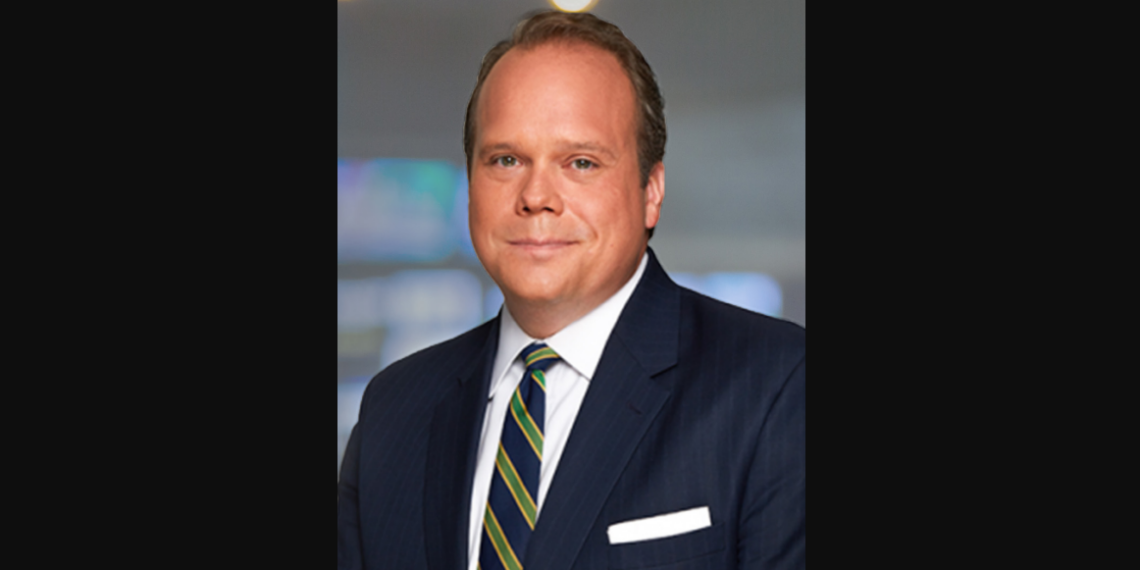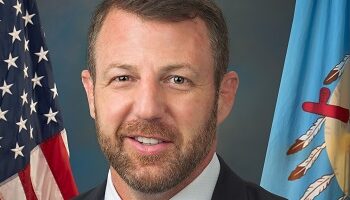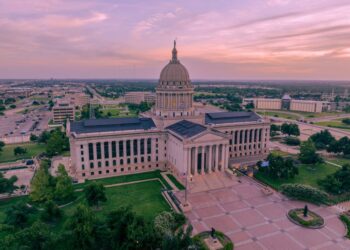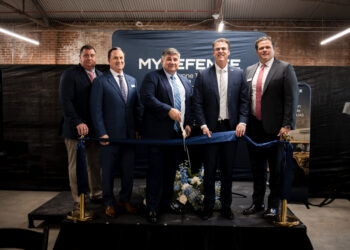OKLAHOMA CITY (OBV) – Popular political commentator Chris Stirewalt will serve as the keynote speaker of The State Chamber of Oklahoma’s upcoming flagship event, Annual Meeting. Stirewalt recently spoke with Oklahoma Business Voice, giving us an early look at the hot topics he will be covering during Annual Meeting.

Stirewalt is a contributing editor and weekly columnist for The Dispatch. He is also currently the host of The Hill Sunday with Chris Stirewalt on NewsNation.
He is a former political editor for the Fox News Channel, where he helped coordinate political coverage. He specialized in on-air analysis of polls and voting trends.
Prior to working at Fox, Stirewalt was a political editor of the Washington Examiner, for which he wrote a twice-weekly column and led political coverage for the newspaper. He worked as the political editor for the Charleston Daily Mail and West Virginia Media as well. He began his career at the Wheeling Intelligencer in West Virginia.
He also wrote a book on media and politics, Broken News: Why the Media Rage Machine Divides America and How to Fight Back, which was published in 2022.
Stirewalt is a senior fellow at the American Enterprise Institute (AEI), where he focuses on American politics, voting trends, public opinion and the media.
The State Chamber’s 2024 Annual Meeting will be held on June 18 at the National Cowboy & Western Heritage Museum in Oklahoma City.
The full one-on-one interview with Stirewalt is shared below:
What is the most exciting part of the 2024 election cycle for you?
Stirewalt: Seeing how Americans do at their ongoing constitutional stress test. When you have [a presidential election] rerun – this is the first rerun that we’ve had since 1956 – and when you have a rerun, the the election is less about the candidates, it’s more about the voters. Nobody’s going to learn anything new about Donald Trump or Joe Biden, right?
This isn’t about getting to know them. This is about where are American voters. In this climate, we sort of failed the test in 2016 and 2020, as voters and as citizens. But we’ve been through this extraordinary period of constitutional and governmental upheaval with a pandemic, with January 6th, with the riots of the summer of 2020. We’ve had lots of upheaval, and we’ve had double impeachments. We’ve had all kinds of stuff.
I’m most curious to see if Americans are sort of sick and tired of being sick and tired when it comes to how our politics work. And that’s what I’m most curious about.
Regarding the populist movement, your take is that Oklahoma is very strong in that.
Stirewalt: Sure, and Oklahoma was a strongly populous state when it was a Democratic state. And Oklahoma is a great example of how populism is not an ideology, it’s a methodology. Populism is a way of leveraging the grievances, legitimate or not, of a subgroup of an electorate. And the the basic message is that these other people are trying to hurt us, or they’re trying to prevent us from getting what we want. It can be crucial for reform. Major reform is driven by dedicated minorities, basically. That’s how major changes come into systems – dedicated, sometimes implacable minorities push against what the majority wants.
What we have had in the United States is not different than most of what the developed Western worlds have experienced in this century, which is there is an upheaval coming. And a lot of this is reflected in the migrant crisis that the United States, as well as Western Europe, have experienced, which is there is this pressure, this constant pressure on the post-Cold War order that we thought was in place. And Oklahoma is a great encapsulation of how those attitudes have migrated from one party to the other. Oklahoma had a strong bent of populism when it was a strongly Democratic state; there’s a strong band of populism as a Republican state. Those kinds of voters may change their registration, but they don’t change their attitudes.
How has political journalism changed during your career?
Stirewalt: It’s changed a lot. And not for the better, mostly. I think what we have to remember is that in the this century, we have seen the blowing up, the evaporation of the old consensus that worked in American news and media for 50 or 60 years, sort of the post-World War II to the turn of the 20th century. There was a way that things operated, and what has happened over time is that it’s become possible for people to pick the news that they want. When I was knee high to a typewriter ribbon, you had only a few choices in terms of what kind of news you were going to get. You could have ABC, CBS, NBC, and you had a local newspaper and that was about it.
There’s a recent survey that the Pew Research Center did on what Americans want from their news, who do they want to get their news from. And half of people who considered themselves either very conservative or very liberal or progressive said that it was very important to them that the people they got their news from shared their ideological beliefs.
We blew up the old consensus, and now we’ve put ourselves into a bunch of different little silos. So, it’s not that there’s a Republican brand news and a Democratic brand news. There are subsections: are you an MSNBC kind of Democrat or a CNN kind of Democrat? Are you a Fox Republican or are you a Newsmax kind of Republican? Are you this website or are you that website? The term audience capture is what we’re talking about here. When you have smaller audiences, you’re more dependent on individual members of that audience, and therefore you’re less likely to want to displease them and more likely to tell them what they want to hear, even if it’s not good for them.
Is there a place for the old school fiscally conservative Republicans in American politics?
Stirewalt: I mentioned the 1956 election. Well, here’s another way this is like the 1956 election. You have one party that has a coalition of college-educated, aspirational, affluent people mixed with the super majority of nonwhite voters. In 1956, that was the Republicans; now, it’s the Democratic Party. On the other side, you have working class voters and the super majority of white middle class and working class voters, which is a lot. And in a state like Oklahoma, it’s a lot.
And so, the migration of these two parties as they’re crossing paths with each other, basically, it comes down to this: Joe Biden, to get reelected, is going to need, in these key states, a bunch of Nikki Haley kind of Republicans to cross over and vote for him. And for Democrats to hold onto these Senate seats in Montana, in Ohio, they need what we used to think of as Oklahoma kind of Democrats, Boren kind of moderate Democrat. Those voters are migrating back to the Democratic Party. They all bolted and went to the Republicans. Now, they’re migrating back.
So, the question is basically this: can the Republican Party remain hospitable to basically pro-growth, pro-business, market-oriented kinds of folks with who their new base is? And can Democrats learn to accept and tolerate these voters whom they need? They’re the most valuable voters, and they’re the most valuable voters because they’re the highest propensity voters. There are fewer of them than there are of other voters, but they’re older, they’re wealthier and they’re more educated, and that makes them all higher propensity voters. So, these are the the prize pigs of the electoral space, and both parties are fighting over them. Uniformly, they want to hear a message that is pro-growth, that is pro-business. And that’s hard for Democrats and Republicans to do right now.
Any credence to the notion that the Democrats will replace Biden on the presidential ticket as we come down the stretch?
Stirewalt: Most years we’d say there’s not no chance but a very low chance. This year, what do you say, is it a one in eight? [The chance is] there, and the space on the calendar does exist. If you’d asked me four years ago what it would be like to have a person running for president who was facing criminal charges, that I was waiting on a jury verdict in the criminal case for a major party nominee, I would have said, “Seems unlikely,” but there you go. So, I’m I I’m not closing the door to anything in 2024. Surprises are ahead for sure.


